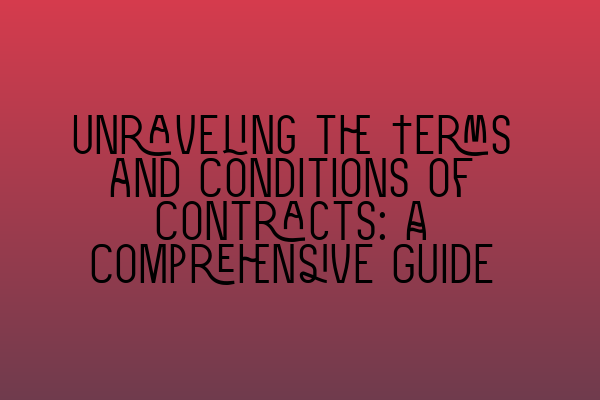Unraveling the Terms and Conditions of Contracts: A Comprehensive Guide
Contracts are an integral part of the legal landscape, governing every aspect of our personal and professional lives. Whether you are buying a home, starting a business, or entering into an employment agreement, understanding the terms and conditions of a contract is crucial to protecting your rights and interests. In this comprehensive guide, we will unravel the complexity of contract terms and conditions, empowering you with the knowledge and tools necessary to navigate this legal landscape with ease.
The Importance of Understanding Contract Terms and Conditions
Contracts are legally binding agreements that establish the rights and obligations of the parties involved. They provide a framework for conducting business and ensure that all parties are held accountable for their actions. A failure to understand and comply with the terms and conditions of a contract can lead to serious legal consequences, including financial loss, damaged reputation, and even litigation.
Therefore, it is crucial to thoroughly review and comprehend the terms and conditions of any contract before signing. This allows you to identify any potential risks or unfavorable terms that could impact your rights and interests. By understanding the contract, you can negotiate better terms or seek legal advice to protect your position.
Breaking Down Contract Terms and Conditions
Contract terms and conditions can often be dense and filled with legal jargon, making them daunting for individuals without a legal background. However, with a systematic approach and some knowledge of key concepts, unraveling contract terms and conditions becomes a manageable task.
1. Identify the Parties Involved
The first step in understanding a contract is to identify the parties involved. This includes not only the names of the individuals or organizations, but also their roles and responsibilities. Understanding who is bound by the contract and the obligations each party has is crucial.
2. Define the Subject Matter
Next, it is important to identify and define the subject matter of the contract. This could be a product, service, property, or any other exchange or agreement. Understanding what is being contracted is essential to grasp the context and purpose of the contract.
3. Outline the Terms and Conditions
The heart of any contract lies in its terms and conditions. This section outlines the rights, obligations, and restrictions of each party. It covers important aspects such as payment terms, delivery schedules, quality standards, confidentiality provisions, and dispute resolution mechanisms. Pay close attention to these clauses, as they can significantly impact your rights and obligations.
4. Consider Governing Law and Jurisdiction
Contracts often include provisions that specify the governing law and jurisdiction that will apply to any disputes that may arise. This determines which country’s laws will be used to interpret and enforce the contract, as well as where any legal actions will be pursued. Understanding the governing law and jurisdiction is essential for assessing your legal rights and remedies.
5. Review Boilerplate Clauses
Boilerplate clauses are standard provisions that are commonly included in contracts. These clauses cover areas such as termination, assignment, force majeure, and entire agreement. Although they may seem routine, they can have far-reaching consequences. Take the time to review these clauses carefully to ensure they align with your expectations and requirements.
6. Seek Professional Advice
While the above steps provide a general framework for unraveling contract terms and conditions, it is important to recognize that each contract is unique and may require specialized expertise.
If you feel overwhelmed or uncertain about any aspect of a contract, it is advisable to seek professional legal advice. A solicitor can review the contract, explain its implications, and highlight any areas of concern or potential negotiation. Their expertise will help you to understand your rights and obligations fully, empowering you to make informed decisions.
Take Control of Contract Negotiations
Understanding contract terms and conditions not only allows you to protect your interests but also puts you in a stronger position during contract negotiations. Armed with knowledge, you can confidently advocate for better terms, address any ambiguities or omissions, and ensure that the contract aligns with your expectations.
Additionally, being able to assess the terms and conditions of a contract effectively will help you avoid potential disputes and reduce the risk of legal challenges in the future. By taking the time to unravel the complexities of a contract, you are investing in your own protection and success.
The Importance of Professional Guidance
When it comes to complex legal matters, there is no substitute for professional guidance. Seeking advice from an experienced solicitor will provide you with the peace of mind that your rights and interests are protected.
If you find yourself facing legal challenges or would like expert assistance with contracts, SQE Contract Law is here to help. Our team of experienced solicitors specializes in contract law and can provide the guidance and support you need. Contact us today for a confidential consultation.
Related Articles
For further information on navigating legal challenges, understanding the SRA competence statement, exploring different solicitor specializations, and more, check out these related articles:
